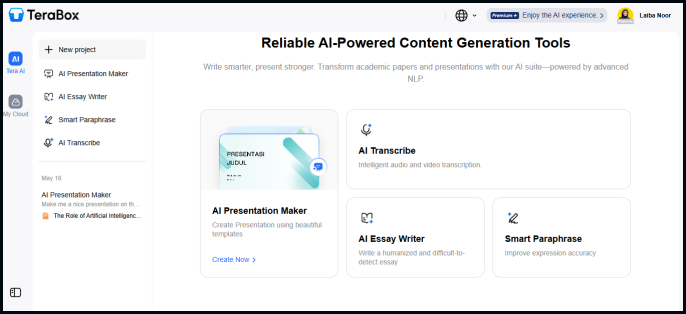When you give a strong presentation, you make it easier for your audience to understand what you convey. And it is even more likely that they’ll listen actively to your ideas and respond.
But here, the question that pops up in the minds of presenters is, “How to give a killer presentation?” Or, “How can I be different from the rest, and which presentation skills I need to master?”
Well, you’re not alone if you think that way. Many beginners who lack effective communication skills lose their confidence and the ability to stand in front of a large group of students or colleagues.
Grab your cup of coffee, and keep reading to know how to excel in your presentation!
What Are Presentation Skills?

Presentation skills refer to the ability to convey ideas, opinions, and information to an audience effectively using written, visual, or oral means. There are different types of these skills, including verbal, visual, nonverbal, and technological skills.
Different strategies and techniques are required to excel in all these types of skills in the long run, as they play an important role in the impact and delivery of presentations.
You need these qualities to communicate effectively and compellingly deliver your speech. Furthermore, they influence the way you structure your presentation and how the listeners receive it.
Creating visual aids, projecting your voice, and understanding body language all come under this one umbrella, and you need to work on every single aspect.
A good presentation relies less on what you convey. Instead, it’s significantly about how you actually say it. Stage presentation, storytelling, and other factors influence how you convey your points and establish connections.
These skills require time to master, and one needs to engage in extensive practice. But the good news is that they’re worth developing as they are not just helpful in academics but also in career growth.
Why Should You Practice Presentation Skills?
Effective presentation is essential in business settings and for achieving specific academic goals. We define presentation skills as a set of soft skills that impact performance in a presentation.
In fact, these are super vital for any business professional who wishes to have effective communication and remove presentation anxiety to face interviews or colleagues.
There are many reasons you should adopt effective presentation skills. Some of them are:
- Increased Confidence: When you learn how to present your thoughts in front of many people who may be judgmental, you become more confident. Although it might not be useful at first due to nervousness, constant practice can make you flawless in discussion.
- Positive Influence: Having strong presentation skills means that you will have the ability to convince or even change the perspective of people on a particular subject through your points. This way, you can learn to effectively sell your ideas and leave a lasting impact through discussion.
- Better Communication: Companies always value individuals and volunteers who know when to speak and what to say. And this is what presentation also teaches. Being a powerful presenter also makes you a fantastic leader and helps you grow in your career in the future.
- Personality Building: You will notice a clear difference in your body language after going through a few rounds of presentation. Habits like maintaining eye contact with the audience and standing straight in front of them without hesitation or a dull tone are what presentation skills enable a person to adopt.
Not only this but there are numerous other benefits of presentation skills that you’ll discover for yourself when you start developing your skills through practice and learning.
20 Effective Presentation Skills You Should Master

Standing in front of a large audience and making your points through a presentation is not as easy as stealing candy from a baby. Sure, it may come to some individuals naturally, but others definitely have to work on their skills.
Are you also the one struggling to find how to improve presentation skills? Here are the skills you must master:
1. Learn to Research and Come Prepared
Presentations without strong facts and evidence are useless. So, make sure you conduct extensive research to compile facts, stories, examples, and stats to support your message.
Doing research the right way itself is a skill. Therefore, try not to go off-topic and understand your audience to resonate with them and state points better.
2. Use Appealing Visual Elements Correctly
Your slides need visual elements to strengthen your presentations. Keep them clear, brief, and visually appealing. Ditch bullet points or paragraphs for GIFs and videos, and let visuals speak.
Additionally, it’s essential to make your slides easy to understand by replacing dense text with visual elements. Your audience must be able to look at the slide and grasp the message instantly.
3. Master Verbal Communication
Another crucial skill to master is verbal communication. Your words have to be concrete, clear, and concise. Speak to the point, offer real-life examples, and ditch the jargon.
To get better at public speaking, you must use some technical terms, eliminate filler words, and add examples or stories in your slides that make your content memorable and relatable.
4. Show Your Leadership
Leadership is of great importance in public speaking. So, believe in yourself and establish your presence with great confidence. Maintain eye contact, speak with confidence, and remain calm.
Your body language will scream that you are the leader here. And when the audience accepts that you’re the captain of the ship, all of them will follow your lead willingly.
5. Use Storytelling to Your Benefit
Nobody wants to sit through boring presentations. Don’t forget to spice it up a bit with storytelling elements. Hook your audience effectively from the very beginning, regardless of the topic.
Only you can make them care about what you have to say by incorporating a certain story. Also, try to be interactive with them to keep listeners attentive and break one-way communication.
6. Learn the Art of Persuasion
Your presentation is like a friendly sales pitch, if you think. The only difference is that you are selling ideas here, not products. That’s why persuasion is crucial.
Clearly outline all the perks, sprinkle in some evidence, and address concerns in a persuasive way that keeps the attention of your audience.
7. Manage Your Inner Emotions
Getting on stage in front of an entire class and speaking constantly is not something that should make you worry. Just control your nerves and turn the tables.
Manage your emotions, especially when unexpected events occur. Handling rejection also plays a part here, and maintaining your composure and focus is crucial in the end.
8. Speak Loudly and Clearly
Speak clearly and loudly to make your points get noticed. You don’t just want to be heard but to be understood, right? Speak with confidence and speak loudly.
A clear voice always commands more attention and cuts through the extra noise. Project your voice sharply from your chest and widely open your mouth while speaking.
9. Handle Your Time Like a Pro
Timing matters a lot. Organize your thoughts precisely in a logical flow within the time limit. Stick to the decided time while explaining all your points without missing anything.
That’s a very important skill if you understand. Also, it’s compulsory that you wind up your presentation 5-10 minutes before the end for audience interaction and possible queries.
10. Understand Yourself Completely
Before you understand your audience, you need to understand yourself first. Know your weaknesses and strengths, and be honest about what you can improve.
On top of that, acknowledge areas for growth without fear. Try to be authentic rather than pretending to be perfect; let your audience see the real you!
11. Be a Problem Solver
A fantastic presentation also provides a fantastic solution to their audience. Prioritize to identify the issues your audience might be facing and present your ideas as the remedy.
In addition, be ready to deal with the challenges that will come with it. Offering real solutions is what makes a presentation memorable in the long run.
12. Leave the Audience with Value
Public speaking experts suggest people focus on how they want their specific audience to feel when they conclude the presentation.
A nice call to action is the most engaging method to wrap it up and leave an impact. Consider ending with a compelling story that reinforces what you’ve shared earlier.
13. Flex Your Funny Bone
Add a pinch of humor to your presentation to captivate the audience’s attention span. Witty remarks, a well-timed joke, or relatable anecdotes can also break the ice.
However, it’s essential to note that it’s eventually a presentation, so you can’t keep cracking jokes or remain unserious. It’s simply about adding a bit of humor to make an impact.
14. Focus on Presentation Delivery
Presenting is not only about what you’re saying; it’s also about how you’re saying it. Use your body language wisely to convey your points.
Understand that pauses aren’t awkward silences; they’re spaces where you let your audience absorb your message. Therefore, your delivery is important for a better connection.
15. Use Breathing Techniques
Take a little moment to breathe before you enter the spotlight. Learn breathing techniques to remain relaxed before your presentation.
Deliberate, slow breaths can also decrease anxiety levels and bring calmness. And yes, it even assists in grounding you in the moment to make you ready for an appearance.
16. Develop Networking Skills
Before you go on the stage, learn about the audience, their pain points, and their interests. This way, you can insert those insights into your discussion.
The benefit? It makes you discover the pain points of your target audience and build your confidence to carry out conversations with them smoothly.
17. Active Listening
Although you’re the one talking in front of people, it doesn’t matter that your audience is of any less importance. In fact, the most appealing presentations are two-way.
Go the extra mile to listen actively, respond to queries, adjust your tone, and measure reactions. See, it’s not only about being heard but even hearing your spectators.
18. Know Your Stuff Inside out
Remember that the best presenters do not stand on stage reading their bullet points on the slides or reading off scripts. It just looks weird and unappealing.
You need to learn and memorize your presentation thoroughly — every pause, gesture, or word. It also helps you with better organization and time management.
19. Use Repetition to Hammer Ideas Home
Repeat your main ideas throughout your discussion. Obviously, you don’t wish to come off as irritating or treat people like they are fools or unintelligent.
But the purpose of this repetition is to ensure that your listeners don’t miss anything important. Also, ask them questions about the fundamental points for engagement.
20. Summarize Well in 90 Seconds
The best way to enhance your presentation skills and test your planning is by speaking the summary of your presentation in just 100 to 200 words before going on stage.
It will test the strength of your thinking, the reliability of your plan, and the clarity of your ideas about the topic. This is the most powerful shortcut to save you time and clear your doubts.
How to Improve Your Presentation Skills?

Whether you’re at your workplace or university, presenting to an audience is a task you’re required to do throughout your life several times. At universities, teachers frequently use this method to see how much their students have learned.
However, if you are struggling with your presentation skills, here’s what you can do:
● Know Your Audience Well
The very first step you need to take is to know your listeners well. It will impact the specific type of presentation you will give in that space.
For example, a business pitch for your company boss will considerably differ from a presentation that is given in biology class in front of students.
● Take Your Time
One of the most prominent mistakes presenters make is that they speak either too slowly or quickly. See, there’s no rush while giving a presentation.
When you speak moderately, it reveals your confidence in your subject and yourself. But make sure that every point is stated clearly.
● Keep Presentation Slides Simple
Too much information on your slide can be distracting for people and discourage them from looking at it. Just don’t fall into the trap of displaying your whole script on the slides.
Instead, using supporting slides created by tools like TeraBox AI PPT Maker can help make your presentation organized and keep points simple yet engaging.
● Practice, Practice, Practice!
The simplest way to improve your skills is to practice. Try to practice in front of a mirror when you’re alone, even if you feel doubtful or embarrassed.
It’ll help you notice where the improvement is required. You can also consider audio recording your presentation to get an idea of how long your presentation is and if anything needs modifications.
Presentation Skills Training: Where to Start
Now that you know all the skills required for giving a presentation effectively, you might be thinking about how to start presentation skills training. Well, it’s normal to think that way and be confused as a beginner.
But do you know what the good news is? Many resources are available on the internet that help students excel in good presentation skills with proper feedback and guidance. Yes, that’s true!
What you need to do is search for online course platforms, such as LinkedIn Learning, Udemy, or Coursera. From there, you can get advanced-level classes.
On top of that, they cover almost everything included in presentations, whether it’s about storytelling or your body language and slide design.
Even if you’re a student and can’t afford expensive courses, you don’t need to worry. This is because these tools are not only flexible but also affordable.
Want hands-on learning instead? Well, it’s pretty easy nowadays to look for public speaking clubs or local workshops in your cities, and you can find out about this through research.
You can also consider a presentation coach if you need constant attention and personalized help. They will hopefully help you improve your clarity and tone and learn how to prepare a pitch.
Tips for Dealing with Presentation Anxiety
It is very natural to get anxious when it comes to public speaking for several reasons. Sometimes, people are nervous because of the audience, while other times, maybe the topic can be an issue of anxiety.
But no worries! There are two pieces of good news for you:
- Anxiety is rarely as noticeable to others in your audience as it is to you.
- You can follow some great tips to help yourself get out of this situation.
So, let’s have a closer look at the tips and strategies to handle anxiety:
Tip #1. Be Prepared. The more you’re familiar with the material you’re going to present, the less nervous you will look on the stage.
Tip #2. Do Practice. Rehearse as much as you can before going on the stage. Speak aloud while preparing and imagine you’re standing in front of people, even when alone.
Tip #3. Plant a Friendly Face. If you have friends in your classroom, use them as your touchstone. You can let him or her know that you get nervous to get motivation.
Tip #4. Focus on Your Success. Many athletes and performers use this strategy. Make sure you visualize yourself speaking successfully and confidently in the event.
Other Helpful Presentation Tips
Some other helpful presentation tips are given below:
- Read the entire room (adjust your pace and tone depending on your audience’s reactions).
- Use the 10-20-30 rule (keep your slides under 10, talk under 20 minutes, and use a 30-point font).
- Rehearse with a timer (practice timed runs so you can stay on track).
- Breathe deeply (try to calm your nerves and speak in a clear manner).
- Prepare for Q&A (prepare yourself for possible questions and be open to discussion).
Create an Engaging Presentation Deck in Seconds

Now that you’re familiar with most of the tips, let’s talk about a few other aspects. As you already know, slides need to support your message and not distract from it.
Therefore, there’s a high need to keep them to the point, visually appealing, and clean. It’s also wise to use quality images with consistent branding and minimal text.
Wondering how you can do this? Try out these tools to make your slides stand out:
- TeraBox AI( 테라박스 AI): It is a handy cloud storage solution and an AI presentation maker that creates top-notch presentations for users with one prompt and makes the files safe and accessible.
- Canva: Many beginner-friendly designs are present in Canva. You can find thousands of templates on this platform for your presentation to make it unique and appealing.
- AI-Powered Assistants: You can use AI tools like ChatGPT to structure your content, generate ideas, and even write speaker notes in a few minutes.
- Beautiful.ai: This tool uses smart templates that continuously adapt when you add content. This way, you can make your slides highly professional.
Conclusion
Mastering a proper set of effective presentation skills can be a hard nut to crack in the beginning. Remember that it doesn’t come magically in a day or two and requires effort and practice.
It goes beyond simple presentation tips or skills or knowing merely what presentation skills are and digs deeper into how flexible you can be in your ability to convey or communicate ideas.
Different audiences and presentations also impact the outcome of your efforts. So, having basic knowledge of how to raise awareness and connect with people can be fundamental here.
Meanwhile, be patient and dedicate your valuable time to working on the skills mentioned in the article above. Even failure is a crucial part of your learning process, so don’t lose hope!











